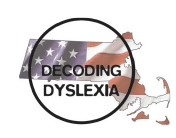|
“There are times as a parent when you realize that your job is not to be the parent you always imagined you’d be, the parent you always wished you had. Your job is to be the parent your child needs, given the particulars of his or her own life and nature.”
--Ayelet Waldman Written by Nancy Duggan As the mother of three adult children, I know that almost any parent can look back and identify the times they wished they had figured things out sooner. If the “particulars” of your child’s needs include dyslexia, as they did for my youngest, recognizing what your child needs and how to be that parent is a unique challenge. You may wish you had more training for the job. Somehow you are trying to manage social, emotional, and academic issues that appear typical to others, yet the typical solutions and guidance seem to add to the problem. You need a compass and a good map. My journey started 20 years ago. I knew my daughter was bright and motivated, but was behind her peers academically and not reaching the milestones her siblings had easily met. When I inquired about the path I should take, every teacher warned me not to compare, to give her time. After all, “she is a delightful child.” So I sat tight—I didn’t want to be that over bearing parent who caused teachers stress. When it finally became apparent to her teachers that needing a little more time was not the issue for my daughter, she had become understandably stressed. One of the oldest in her class, she was clearly intelligent, but I had an 8 year old facing fourth grade with literacy skills below kindergarten level. This was despite 2 years of preschool and 4 years of primary school—and yes, I read to my child, thank you very much! Finally, somebody said “dyslexia.” One word turned the typical childhood path of academia into unchartered territory, and there was much to learn about the new and unfamiliar terrain for this journey. My dad used to say, “when all else fails, follow the directions.” I found myself learning about dyslexia, Orton-Gillingham, resilience, and child development. My research exposed me to some fascinating insights into how children succeed academically and socially and, not wanting to waste any more precious time, I became an informed consumer. Once I had familiarized myself with the terrain of parenting a child with dyslexia and knew the destination for which we were headed, I discovered my child was the compass to direct our path. I was forging the trail, but would go in circles without reading the compass. With this in mind, I share a few travel tips for the journey of raising children with dyslexia:
Comments are closed.
|
Proudly powered by Weebly

 RSS Feed
RSS Feed